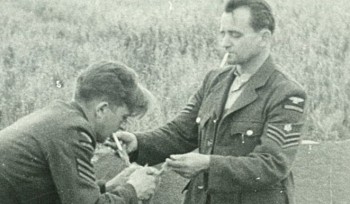
This week Germany broadcast the news of the massacre at Katyn of Polish army officers and intellectuals murdered by the Soviet secret police. On 14 April Stalin’s oldest son died in a German POW camp; Stalin had previously refused his exchange. On 18 April Admiral Yamamoto, commander of the Japanese Fleet, was shot down and killed by American fighters over the Solomon Islands. And on the same say 69 German planes heading for Tunisia were shot down by Allied aircraft in what became known as the “Palm Sunday Massacre”.
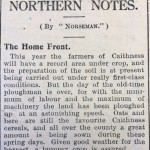 In much of Caithness the spring sowing was getting a boost from some fine weather. As the John O’Groat Journal noted, “This year the farmers of Caithness will have a record area under crop, and the preparation of the soil is at present being carried out under really first-class conditions… Oats and bere are still the favourite Caithness cereals, and all over the county a great amount is being sown during these spring days.”
In much of Caithness the spring sowing was getting a boost from some fine weather. As the John O’Groat Journal noted, “This year the farmers of Caithness will have a record area under crop, and the preparation of the soil is at present being carried out under really first-class conditions… Oats and bere are still the favourite Caithness cereals, and all over the county a great amount is being sown during these spring days.”
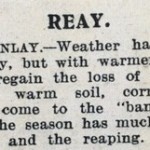
In Reay however, “Weather has kept back the downlay, but with warmer days crops will soon regain the loss of even a fortnight. In warm soil, corn has been known to come to the “band” in three months.”
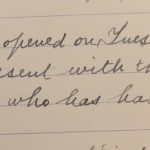 Schools across the county went back after the Easter holidays. As the School Log Book records, “School reopened on Tuesday and all the scholars were present with the exception of one viz. M. Lowe who has had a slight inflammation of the eyes.”
Schools across the county went back after the Easter holidays. As the School Log Book records, “School reopened on Tuesday and all the scholars were present with the exception of one viz. M. Lowe who has had a slight inflammation of the eyes.”
It had been proposed to open a cleansing station at Wick Riverside, to meet sanitary regulations 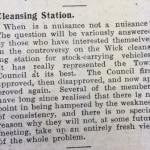 about cleaning vehicles transporting livestock to and from market. This week in the John O’Groat Journal, “Norseman” took a sarcastic view of the lengthy debate so far: “The [Town] Council first approved, then disapproved, and now approved again. Several of the members have long since realised that there is no point in being hampered by the weakness of consistency, and there is no special reason why they will not, at some future meeting, take up an entirely fresh view of the whole problem.”
about cleaning vehicles transporting livestock to and from market. This week in the John O’Groat Journal, “Norseman” took a sarcastic view of the lengthy debate so far: “The [Town] Council first approved, then disapproved, and now approved again. Several of the members have long since realised that there is no point in being hampered by the weakness of consistency, and there is no special reason why they will not, at some future meeting, take up an entirely fresh view of the whole problem.”
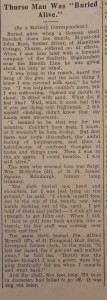 Finally this week, the paper reported the fortunate escape of John Ross from Thurso, now a soldier in the Seaforth Highlanders. During the recent fighting in the Tunisian desert his trench was hit by a shell and he was buried alive in sand. “I was lying in the trench, heard the bang of the gun, and the next thing I knew I was covered in sand… I was helpless, couldn’t move, felt I was suffocating. Opened my mouth to shout. It filled with sand.” He was pulled out by his sergeant, who told a reporter: “I shook myself free, ran to the top of the trench, saw two hands sticking out of the sand. I got hold of them and pulled – it took all my strength to get John out. When I did, I had to pull him back quickly into a trench, for the stuff was coming over thick and fast.” Remarkably, the shell hadn’t even exploded.
Finally this week, the paper reported the fortunate escape of John Ross from Thurso, now a soldier in the Seaforth Highlanders. During the recent fighting in the Tunisian desert his trench was hit by a shell and he was buried alive in sand. “I was lying in the trench, heard the bang of the gun, and the next thing I knew I was covered in sand… I was helpless, couldn’t move, felt I was suffocating. Opened my mouth to shout. It filled with sand.” He was pulled out by his sergeant, who told a reporter: “I shook myself free, ran to the top of the trench, saw two hands sticking out of the sand. I got hold of them and pulled – it took all my strength to get John out. When I did, I had to pull him back quickly into a trench, for the stuff was coming over thick and fast.” Remarkably, the shell hadn’t even exploded.
